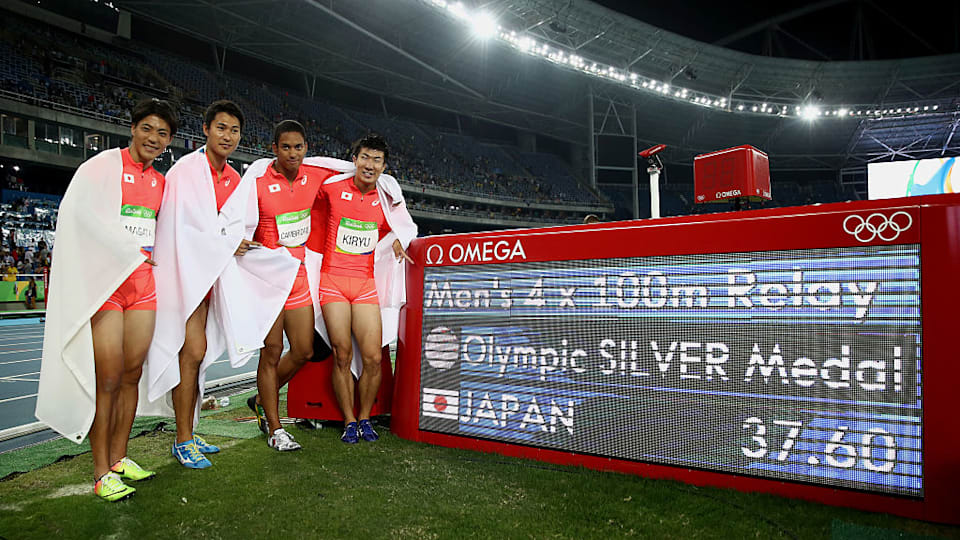
Japan won a total of 41 medals (12 gold, 8 silver, and 21 bronze) at the Olympic Games Rio 2016, but what thoughts crossed the minds of Japanese athletes as they appeared on the biggest stage of them all? In this series, we look back at the incredible events from Brazil that are still fresh in the collective memory of the next host country.
Result for men’s athletics, 4x100m relay
1st place: Jamaica 37.27
2nd place: Japan 37.60
3rd place: Canada 37.64
CAMBRIDGE Aska, wearing the Japanese red uniform, left a red flash on the blue track as he chased down Jamaica’s Usain Bolt, the world’s fastest-ever sprinter.
With each step, the team ran deeper into a realm in which Japan had never before ventured. Cambridge dashed across the finish line, clocking in at 37.60 and set a new Asian record.
19 August 2016 would go down in history for the Japanese track and field team.
The baton passing technique, which gave Japan its edge, magnificently compensated for the team’s disadvantage in terms of the capacity of the individual sprinters. The under-hand baton exchange (or up-sweep pass) adopted by Japan since the 2000s has a strong advantage in allowing the smooth acceleration of the receiving athlete.
With the over-hand exchange (or down-sweep pass) adopted by relay teams of many countries, the total running distance can be lessened to a greater degree (due to stretching of the arms during baton pass), but the receiver needs to start running in an awkward posture of having the receiving hand lifted backwards. In contrast, with the under-hand exchange, the baton is delivered from underneath the receiver’s hand stretched out at hip height, allowing the receiver to accelerate in a steady running form.
In the final relay race at Rio 2016, all countries except Japan employed the over-hand exchange. Japan had been working on modifying its under-hand pass in an effort to increase accuracy and shave off as much total distance as possible, thereby narrowing the gaps with their rival teams.
The difference in the baton-passing style was manifested in the final result.
YAMAGATA Ryota, the first runner, displayed his signature flying start and raced neck-and-neck with the leading sprinters.
IIZUKA Shota, in the second leg, received the baton with dexterity and maintained the team’s strong position in the race, handing over to KIRYU Yoshihide, a proficient third-leg runner, who moved up beside Jamaica in the lead with his expected fine sprint performance.
Receiving the baton without losing speed, anchor leg runner Cambridge shook his rivals off his tail, keeping the second position until he dashed through the finish line after Bolt.
As of then, the personal best times in the 100m set by Yamagata, Iizuka, Kiryu, and Cambridge were 10.05, 10.22, 10.01, and 10.10 seconds respectively.
At the Rio 2016 Games, Yamagata and Cambridge were defeated in the men’s 100m semi-final, Kiryu could not make it through the 100m preliminary round and Iizuka also lost in the men’s 200m preliminary round - all failing to achieve results on an individual level.
By contrast, every single member of the Jamaican and U.S. quartets had personal best times of under 10 seconds.
Bolt applauded the Japanese team, saying “Japan was great. I was surprised to see their outstanding baton passes.”
But surely, baton exchange could not have been the only contributor to this feat? Although the team members achieved disappointing results in the individual events, their personal sprinting performances had certainly improved, which was another positive factor. Their gratifying sprint at the relay testifies to this fact.
At the Beijing 2008 Games, Japan won its first bronze medal in the men’s 4x100m relay event (the bronze was upgraded to silver in December 2018). After eight years, they stepped up a notch to silver. To move up another notch and reach the pinnacle, the team will need to further hone its baton passing skills and improve the individual performance of each member.
Yamagata, the first runner, was quick to look to the future. “Having won the silver medal this time means that we are ready to aim for gold. At the next Olympic Games in Tokyo, I want us to target the gold,” he said.
Cambridge, who served as the anchor, also expressed his resolve, adding “this time, our baton pass went really well, but next time, we’d like to come back with our individual capabilities enhanced to an even higher level.”
Japan’s history-making accomplishment of 37.60 seconds provides a promising outlook for the Tokyo 2020 Games.
If all four sprinters can run 100m in under 10 seconds, Japan’s dream of clinching the gold medal could well turn into reality.
